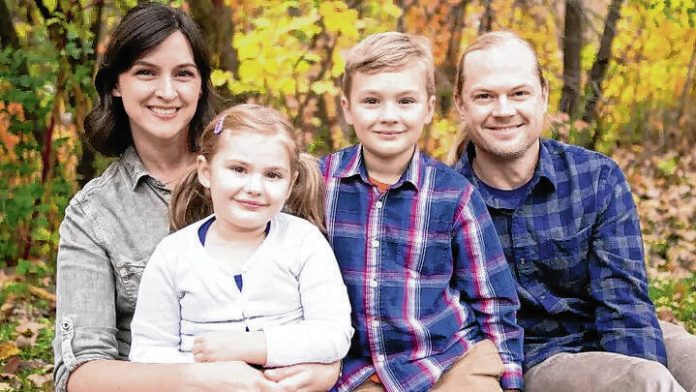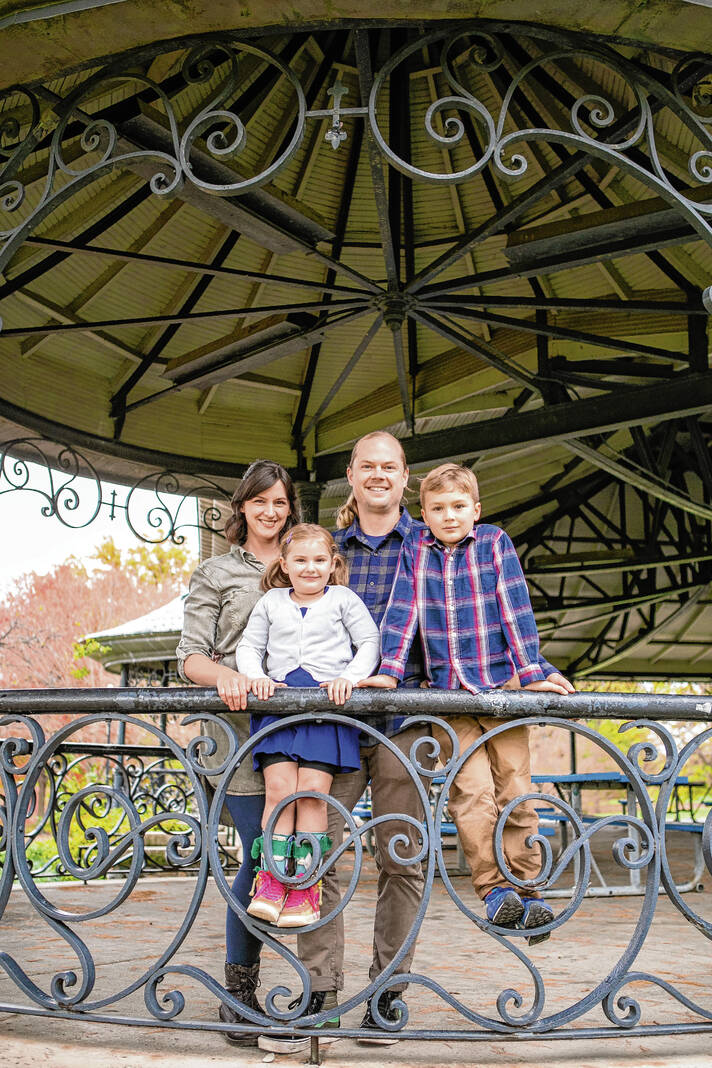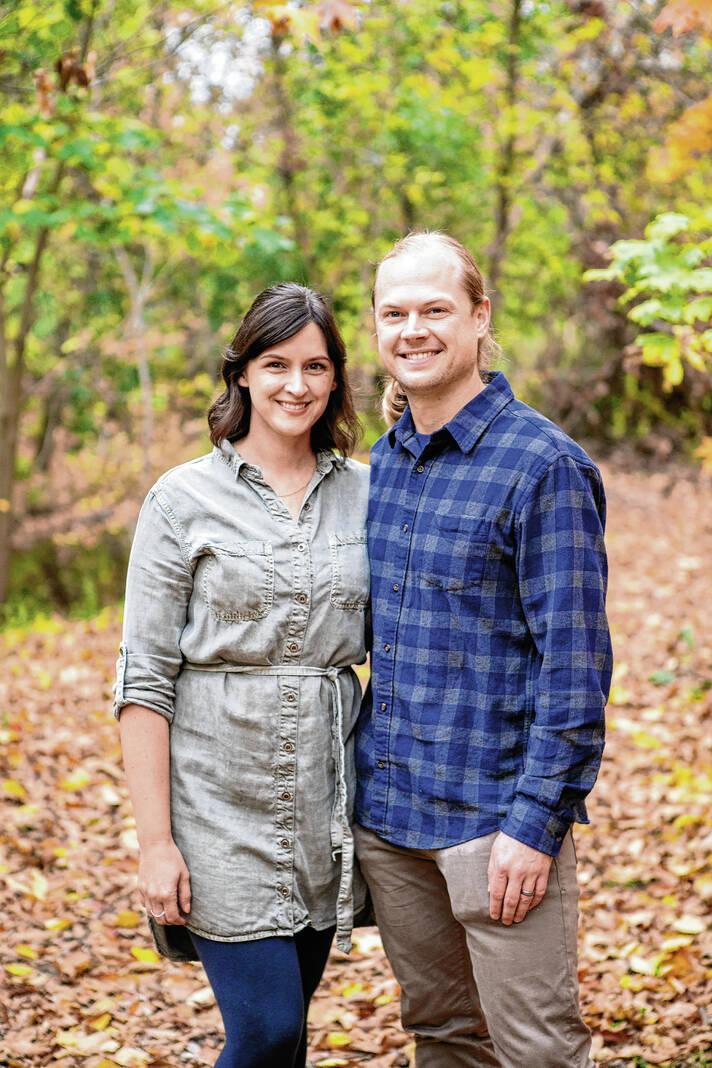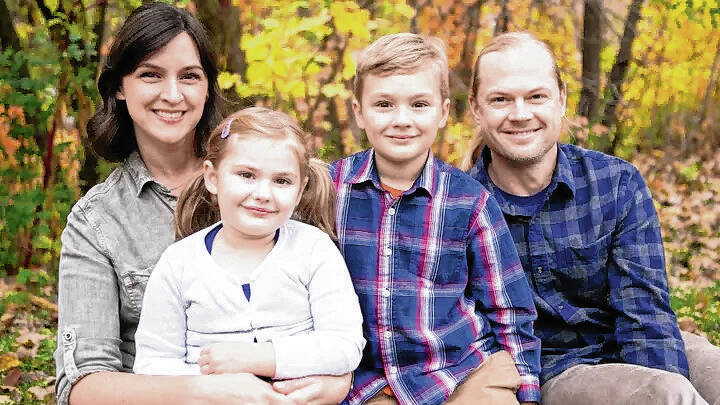Emily and Jeff Litsey had suffered one devastation after another over the past year. After a rare genetic diagnosis for their 5-year-old child, a breast cancer diagnosis and a stroke that led to surprise heart surgery, the past 12 months have been a painful, difficult journey for the southside Indianapolis family of four.
The people around them saw they needed help.
“They’re too humble to ask, but I know they need it,” said Matt Gonzales, a family friend, said in a GoFundMe he created to help with medical bills.
The Litseys never would have guessed the kindness that poured forward. In a little over 24 hours, more than $48,000 was raised for the family.
Now, they want to use that generosity to raise awareness about and fund research into hereditary spastic paraplegia, the genetic disorder their daughter Flora was diagnosed with.
“We’re hoping that the research is going to help create some more ways to intervene before the degenerative nature of the disease takes over, especially for the kids who have the more complex issues,” Emily Litsey said. “We want them to be able to find interventions early, as soon as they get diagnosed so that they can be working out those as they get older.”
Owners of Calvin Fletcher’s, coffee shop in Fountain Square, Emily and Jeff Litsey aim to turn small moments into memorable encounters with each person who walks through the door. Current and former customers of the coffee company say the Litsey family makes it a point to know their customers personally and create a welcoming and unique environment.
“There are no kinder people out there,” one woman commented on the GoFundMe. “Sending so much love and support to a family that deserves so much more. I hope you all feel the outpouring and love of your community as you have given to all of us.”
But the past year has seemingly been one trial after another for the Litseys.
Their ordeal started when their 5-year-old daughter Flora was diagnosed with hereditary spastic paraplegia, or HSP. The disease name refers to a group of more than 80 different genetic conditions that fall under the umbrella of HSP, which can be inherited in different ways; not all children in a family will develop symptoms.
There are no treatments to prevent, slow or reverse HSP, according to National Institute of Neurological Disorders and Stroke. The condition affects 10,000 to 20,000 individuals in the United States, according to UCLA Health.
The primary symptom of the disorder is difficulty walking. Signals from Flora’s brain telling her legs and feet to move are breaking down, Emily Litsey said. Over time, her legs receive fewer and fewer signals, making it harder to connect her body to what it is her brain wants her to do.
On a day-to-day basis, Flora has difficulty walking. Without her leg braces, she often falls, though she always gets right back up as if nothing happened, Emily Litsey said. As she gets older, her parents worry that falling could become more of an issue. HSP is a progressive disease and most people’s symptoms worsen as they get older, Emily Litsey said.
“She’s just adapting and it hasn’t slowed her down. So we’re trying to do what we can for her as she moves forward to keep that momentum going,” Emily Litsey said.
Though there is no cure for HSP, the Litseys hope that will change within their daughter’s lifetime.
“We’re hoping that because she’s so young and they’re doing these research studies now that in her lifetime, there could potentially be a lot of support for her and, if not a cure, at least ways to make her quality of life really good as she gets older,” Emily Litsey said.
While planning their daughter’s treatment, the family was dealt another body blow when Emily Litsey was diagnosed with breast cancer. A first surgery didn’t successfully get the tumor, leading to a second and third surgery last November and December and daily radiation treatments following. An art teacher at Whiteland Community High School, Emily Litsey continued to work throughout her treatment with no long-term absence.
Then in February, Jeff Litsey was rushed to the hospital with what seemed like a migraine; it turned out to be a stroke. Multiple tests revealed a hole in his heart that required surgery on March 20.
Emily and Jeff Litsey both ended up receiving treatment at the same time while his parents took care of Flora and her brother, Leo.
The experience has been “deeply traumatic, both mentally and physically,” for the Litsey family, a friend said in a GoFundMe Post.
But when you ask the Litsey family how they’re doing, they’ll smile and say “we’re doing okay,” despite the looming medical bills and extensive hospital visits.
When Gonzales approached the two about starting a fund to assist them with their medical bills, they were reluctant.
“We know everybody has their own burdens to bear through their own stuff, we don’t want to make people feel like they need to direct funding towards us when you know certainly they have their own medical things and children and everything’s expensive and so we kind of went back and forth on it,” Emily Litsey said.
Finally, they gave their friend the OK to start the GoFundMe. After only an hour of the fund being posted, Emily Litsey checked to see over $4,000 had been raised already.
“At that point, I was overwhelmed and like ‘oh my gosh, that’s so incredibly helpful,’” Emily Litsey said. “I can’t believe that … I thought if this is it, like if this is all we get, this is amazing.”
As the night went on, donations from former students, customers from the coffee shop and more were pouring in for the Litsey family, leaving Emily in tears and full of gratitude.
By the time it was closed, the fund had generated $48,233.
“We’re so shocked and overwhelmed,” Emily Litsey said. “In that particular chain of events that 24 hours, it was a lot of surprise. But also just so much gratitude that people were willing to step in and help support us even when it went past the limit.”
The Litseys figured they may raise enough money to pay off the first round of medical bills, but never expected to raise enough money to pay their medical bills and then some. Once they address their immediate bills, the Litseys will investigate other ways to help their daughter.
Seeing comments and interactions from customers and former students was humbling for them, Emily Litsey said. She often wonders if her work through the coffee shop, or if her work as a teacher, is having an impact. Now, she knows it does.
The Litsey family can breathe a small sigh of relief through the generosity of the community. They can now focus more attention on Flora.
“I think the bottom line for me is just the impact of the community. A lot of people putting together something small can have a huge impact,” she said. “And that’s a lesson that we’ll take with us for the rest of our lives. And that’s going to kind of change how we operate.”
They plan to travel to Boston Children’s Hospital, which has the first spastic paraplegia research network in the United States. Physician-scientists and multidisciplinary teams from nine research centers will collaborate to develop a framework for HSP research that will “ultimately improve the lives of children and adults affected by HSP,” according to their website.
To learn more about HSP, visit childrenshospital.org/conditions/hereditary-spastic-paraplegia









